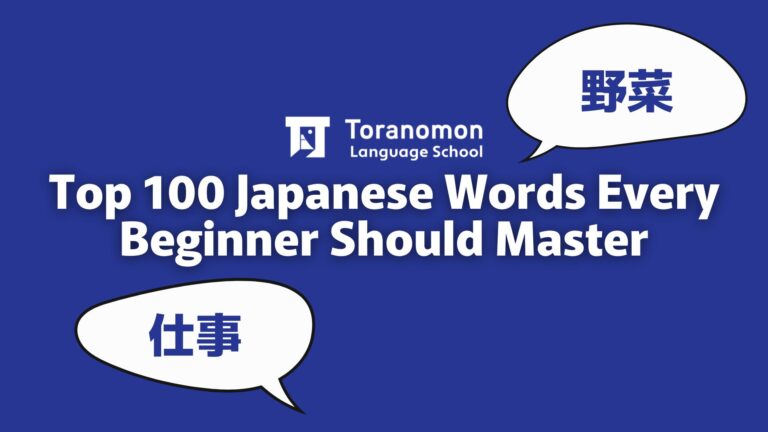Learning Japanese can feel like a huge challenge at first, but the good news is that you don’t have to memorize thousands of words right away. Starting with the most common and useful vocabulary will give you the foundation you need to begin speaking and understanding daily conversations.
To help you on your journey, we’ve compiled 100 essential Japanese words every beginner should know, broken down into categories.
1. Greetings & Basics
- こんにちは (Konnichiwa) — Hello / Good afternoon
- おはよう (Ohayō) — Good morning
- おやすみ (Oyasumi) — Good night
- ありがとう (Arigatō) — Thank you
- すみません (Sumimasen) — Excuse me / Sorry
- はい (Hai) — Yes
- いいえ (Iie) — No
- どうぞ (Dōzo) — Please (offering something)
- お願いします (Onegaishimasu) — Please (request)
- よろしくお願いします (Yoroshiku onegaishimasu) — Nice to meet you / Please treat me well
2. People & Pronouns
- 私 (Watashi) — I, me
- あなた (Anata) — You
- 彼 (Kare) — He / boyfriend
- 彼女 (Kanojo) — She / girlfriend
- 友達 (Tomodachi) — Friend
- 家族 (Kazoku) — Family
- 父 (Chichi) — Father
- 母 (Haha) — Mother
- 先生 (Sensei) — Teacher
- 学生 (Gakusei) — Student
3. Numbers & Time
- 一 (Ichi) — One
- 二 (Ni) — Two
- 三 (San) — Three
- 四 (Shi / Yon) — Four
- 五 (Go) — Five
- 六 (Roku) — Six
- 七 (Shichi / Nana) — Seven
- 八 (Hachi) — Eight
- 九 (Kyū) — Nine
- 十 (Jū) — Ten
- 今日 (Kyō) — Today
- 明日 (Ashita) — Tomorrow
- 昨日 (Kinō) — Yesterday
- 時間 (Jikan) — Time
- 今 (Ima) — Now
4. Common Verbs
- する (Suru) — To do
- ある (Aru) — To exist (inanimate)
- いる (Iru) — To exist (animate)
- 行く (Iku) — To go
- 来る (Kuru) — To come
- 見る (Miru) — To see / watch
- 食べる (Taberu) — To eat
- 飲む (Nomu) — To drink
- 話す (Hanasu) — To speak
- 聞く (Kiku) — To listen / ask
5. Daily Life Words
- 学校 (Gakkō) — School
- 仕事 (Shigoto) — Work / job
- 店 (Mise) — Shop / store
- 家 (Ie) — House
- 駅 (Eki) — Train station
- 車 (Kuruma) — Car
- 電車 (Densha) — Train
- バス (Basu) — Bus
- 道 (Michi) — Road / street
- お金 (Okane) — Money
6. Food & Drinks
- 水 (Mizu) — Water
- お茶 (Ocha) — Tea
- コーヒー (Kōhī) — Coffee
- ご飯 (Gohan) — Rice / meal
- パン (Pan) — Bread
- 肉 (Niku) — Meat
- 魚 (Sakana) — Fish
- 野菜 (Yasai) — Vegetables
- 果物 (Kudamono) — Fruit
- 酒 (Sake) — Alcohol
7. Places & Nature
- 山 (Yama) — Mountain
- 川 (Kawa) — River
- 海 (Umi) — Sea
- 空 (Sora) — Sky
- 公園 (Kōen) — Park
- 病院 (Byōin) — Hospital
- 銀行 (Ginkō) — Bank
- 図書館 (Toshokan) — Library
- トイレ (Toire) — Toilet
- レストラン (Resutoran) — Restaurant
8. Adjectives & Descriptions
- 大きい (Ōkii) — Big
- 小さい (Chiisai) — Small
- 新しい (Atarashii) — New
- 古い (Furui) — Old
- 高い (Takai) — Tall / expensive
- 安い (Yasui) — Cheap
- 速い (Hayai) — Fast
- 遅い (Osoi) — Slow
- 良い (Yoi / Ii) — Good
- 悪い (Warui) — Bad
9. Question Words
- 何 (Nani) — What
- 誰 (Dare) — Who
- いつ (Itsu) — When
- どこ (Doko) — Where
- どうして (Dōshite) — Why
- どう (Dō) — How
- いくら (Ikura) — How much
- どれ (Dore) — Which
- どの (Dono) — Which (before a noun)
- なんで (Nande) — Why (casual)
10. Handy Expressions
- わかります (Wakarimasu) — I understand
- わかりません (Wakarimasen) — I don’t understand
- 大丈夫 (Daijōbu) — It’s okay / I’m fine
- 元気 (Genki) — Healthy / well
- いってきます (Ittekimasu) — I’m leaving (see you later)
Final Thoughts
By mastering these 100 essential words, you’ll be equipped to handle everyday conversations, read basic signs, and start building confidence in Japanese.
Remember, learning vocabulary is just the beginning, using it in real conversations is where true mastery happens. This Back to School season, our courses here at Toranomon Language School are filling up quickly! Don’t miss our exclusive promotions designed to help you kickstart your Japanese learning journey and build a solid foundation for success. Use this link to get started on your learning journey and use code “Back2School” for ¥10,000 off all courses!

